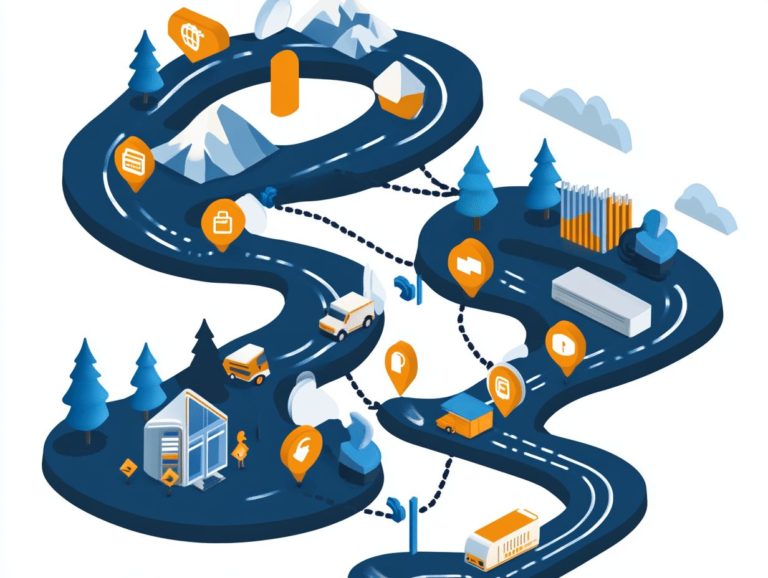Implementing CRM in the Retail Sector
In today s fiercely competitive retail landscape, grasping the intricacies of Customer Relationship Management (CRM) is essential for success. This article delves into what CRM truly entails and why it holds significant importance for retailers who aspire to elevate customer experiences.
Get ready to explore the many benefits of implementing CRM, including heightened customer satisfaction, boosted sales, and fortified loyalty. However, challenges such as data management and securing employee buy-in may arise along the way.
We ll provide you with actionable steps to ensure the successful implementation of CRM and guide you on how to effectively measure its impact. Embrace this opportunity to unlock the full potential of CRM in your retail endeavors.
Contents
- Key Takeaways:
- Understanding CRM in the Retail Sector
- Benefits of Implementing CRM in Retail
- Challenges of Implementing CRM in Retail
- Steps to Successfully Implement CRM in Retail
- Measuring the Success of CRM in Retail
- Frequently Asked Questions
- What is CRM and why is it important in the retail sector?
- How can implementing CRM benefit my retail business?
- What are the key components of a successful CRM implementation in the retail sector?
- What are some challenges that businesses may face when implementing CRM in the retail sector?
- How can businesses ensure a smooth CRM implementation in the retail sector?
- Can implementing CRM in the retail sector improve customer satisfaction and loyalty?
Key Takeaways:

Implementing CRM in the retail sector can greatly improve customer satisfaction by providing a personalized and seamless shopping experience. By implementing CRM in retail, businesses can see an increase in sales and revenue as well as enhanced customer loyalty. Challenges in implementing CRM in retail include data management, employee resistance, and choosing the right system, but these can be overcome with proper planning and strategies.
Understanding CRM in the Retail Sector
Grasping the nuances of CRM in the retail sector is crucial for any business looking to elevate its customer experience and stimulate growth. Customer Relationship Management (CRM) encompasses the strategies and technologies you employ to manage and analyze customer interactions throughout their buying journey.
By utilizing the strength of CRM software, you can refine your sales strategies, tailor your marketing campaigns, and enhance communication channels with your customers. This leads to greater customer retention and satisfaction.
Adopting this overall method empowers your sales teams to pinpoint opportunities and manage client information efficiently, paving the way for informed, data-driven decisions and improved overall performance.
Defining Customer Relationship Management
Customer Relationship Management (CRM) is your strategic ally in managing interactions with customers. By utilizing CRM software, you can effortlessly organize client information and enhance your communication channels.
This software serves as a centralized hub for storing crucial customer data, allowing you to track interactions across multiple touchpoints. By harnessing this capability, your sales teams can uncover valuable insights into customer preferences, behaviors, and purchasing patterns.
You ll find that it streamlines communication between your sales associates and clients, ensuring that timely follow-ups are the norm and concerns are addressed without delay. The ability to track customer histories gives you the power to personalize your sales approach, ultimately boosting customer satisfaction and loyalty.
By effectively leveraging customer insights, you can tailor your services to meet their needs, fostering stronger relationships and driving significant sales growth.
Importance of CRM in Retail
The importance of CRM in retail cannot be overstated; it plays a pivotal role in enhancing the customer experience, fostering loyalty, and streamlining data management processes.
By leveraging CRM systems, you can gain invaluable insights into customer preferences and behaviors, allowing you to identify patterns and trends with remarkable clarity. This understanding gives you the power to craft personalized marketing campaigns that resonate more profoundly with your audience.
Improved engagement emerges from your ability to deliver targeted promotions and relevant content, leading to more effective sales strategies. This leads to a significant boost in customer retention rates, cultivating a loyal customer base that feels genuinely understood and valued ultimately driving sustained growth for your business.
Benefits of Implementing CRM in Retail
Implementing CRM in retail offers a wealth of advantages that can greatly elevate customer satisfaction, optimize sales opportunities, and strengthen customer retention. This approach ultimately fosters improved customer loyalty and drives business growth, positioning you for long-term success in a competitive market.
Consider implementing these CRM strategies in your retail business to fully realize their benefits.
Improved Customer Satisfaction
Improved customer satisfaction is one of the primary benefits of implementing Customer Relationship Management (CRM) in retail. It enables you to offer a personalized experience tailored to each customer interaction.
By harnessing advanced CRM systems, you can track customer preferences and behavior patterns effectively. This ensures that every interaction is significant and relevant. You can send timely reminders for follow-ups, optimizing the customer journey and keeping communication lines open.
With these automated features, you demonstrate your attentiveness to customer needs and cultivate deeper engagement. Over time, the insights gained from analyzing this data empower you to make informed, data-driven decisions. This refines your strategies, ultimately enhancing your understanding of customer expectations and desires.
Increased Sales and Revenue

Increased sales and revenue are the prized outcomes of effective CRM implementation. It allows you to identify and capitalize on sales opportunities more efficiently throughout your sales pipeline.
By leveraging advanced CRM tools, your sales team can streamline lead tracking processes and enhance lead segmentation. These systems provide valuable insights into customer behavior and preferences, allowing you to categorize leads based on demographics, engagement levels, and buying potential.
This means you can tailor marketing campaigns with precision, ensuring that the right messages reach the right audiences at the right times. This personalized approach elevates customer engagement and cultivates stronger relationships, ultimately driving higher conversion rates and boosting overall revenue.
Enhanced Customer Loyalty
Enhanced customer loyalty is a key advantage of CRM systems. These tools empower you to understand and cater to your customers’ preferences better, fostering long-term relationships that every business desires.
By leveraging personalized messaging and targeted marketing strategies, you can forge deeper connections with your customers. This thoughtful approach ensures that your marketing efforts are relevant and resonate with different customer profiles, ultimately elevating the overall consumer experience.
Effective collaboration within your team enhances your ability to analyze data and refine strategies. When customers feel valued and understood, their loyalty to your brand grows significantly, creating a win-win scenario for both you and your clientele.
Challenges of Implementing CRM in Retail
Implementing CRM in retail offers numerous advantages but also presents challenges.
You may encounter hurdles related to the implementation process, data management, and employee resistance. The necessity for effective training and seamless integration cannot be overlooked.
Data Management and Integration
Data management and integration are substantial challenges for retailers implementing CRM systems. It involves managing vast amounts of customer data and ensuring it meshes seamlessly with your existing business technologies.
This task is critical as you strive to leverage customer insights for improved decision-making and targeted strategies. By managing your data effectively, you can create a comprehensive view of customer interactions and preferences, allowing your sales teams to tailor their approaches for maximum impact.
Integrating CRM systems with third-party tools enhances your analytics capabilities, providing deeper insights into customer behavior. Ultimately, these robust data management practices streamline your operations and empower your teams to cultivate meaningful relationships, driving both customer satisfaction and business growth.
Employee Resistance and Training
Employee resistance to change can challenge the implementation of Customer Relationship Management (CRM) systems in retail. Effective training and team collaboration are essential to overcoming these hurdles.
Management should establish open communication channels. This allows team members to voice concerns and provide feedback comfortably.
Regular check-ins and automated reminders for training sessions keep everyone informed and engaged during transitions. A culture of support will motivate employees to embrace new technology.
By involving employees in decision-making and showcasing success stories, organizations can turn apprehension into enthusiasm, leading to seamless integration and enhanced productivity.
Steps to Successfully Implement CRM in Retail
Follow simple steps to implement CRM successfully in retail.
Start with clear objectives. Next, select a CRM system that fits your business needs and technology.
Identifying Objectives and Goals

Identifying your objectives is the cornerstone of successful CRM implementation. This step helps establish benchmarks for measuring success and improving customer engagement.
Set specific and measurable objectives. These will guide your process and help you make informed decisions about customer interactions.
Focus on improving response times, increasing customer satisfaction, and boosting sales opportunities. This targeted approach streamlines workflows and creates meaningful connections with customers.
Choosing the Right CRM System
Choosing the right CRM system is crucial for your retail business. It influences both the effectiveness of integration and the experience for your sales teams.
Consider scalability when evaluating options. You need a system that grows with your business while maintaining performance.
Ensure features align with your sales teams’ needs, including robust tracking for emails and customer interactions. Don’t overlook seamless integration capabilities with your existing technology.
Training and Implementation Strategies
Effective training and implementation strategies are vital for overcoming employee resistance. They ensure a smooth CRM rollout in retail environments.
Explore various training methods tailored to your teams. Interactive workshops foster collaboration and help employees master data organization.
- Incorporate hands-on training sessions with real-world scenarios. This empowers staff to feel more comfortable using the system.
Emphasizing team collaboration through shared goals enhances user adoption and contributes to a unified customer experience.
Measuring the Success of CRM in Retail
To measure CRM success, establish key metrics. These metrics will evaluate the implementation effectiveness and its impact on customer satisfaction and business growth.
Key Metrics to Track
Key metrics to monitor for CRM success include customer satisfaction levels, sales pipeline progression, and the effectiveness of automated reminders in improving customer interactions.
By keeping a close eye on these indicators, you can uncover valuable insights into your operational performance. This allows you to pinpoint both strengths and areas that need improvement.
Understanding customer satisfaction reveals how well your current CRM strategies resonate with clients.
Meanwhile, tracking sales pipeline progression gives you a clear picture of potential revenue streams.
Looking at how reminders affect customer engagement can refine your practices, ensuring that your interactions are both timely and relevant.
Together, these metrics will guide you in making necessary adjustments to your CRM strategies, ultimately enhancing customer loyalty and driving your business growth.
Adjustments and Improvements
Adjusting and improving based on the data gathered from key metrics is essential for refining your CRM implementation and enhancing overall business performance.
By carefully analyzing trends in customer interactions and feedback, you can uncover valuable insights that pinpoint specific areas in need of enhancement.
This process not only reveals opportunities to strengthen customer relationships but also highlights potential sales avenues that may have previously slipped under the radar.
As you assess your CRM strategies, adapting to shifting market dynamics is crucial. This ensures your approach remains both relevant and effective.
Effective data analysis creates a roadmap for your tailored solutions that resonate with your audience, ultimately driving both customer satisfaction and company growth.
Frequently Asked Questions

What is CRM and why is it important in the retail sector?
CRM stands for Customer Relationship Management, which is a strategy that focuses on managing and improving interactions with customers. In the retail sector, CRM is crucial as it helps businesses understand and cater to their customers’ needs and preferences, ultimately increasing satisfaction and loyalty.
How can implementing CRM benefit my retail business?
Implementing CRM in the retail sector can benefit your business in several ways. It allows for better customer segmentation, personalized marketing campaigns, improved customer service, and ultimately, increased sales and retention.
What are the key components of a successful CRM implementation in the retail sector?
The key components include a well-defined strategy, reliable CRM software, proper training for employees, data management and analysis, and continuous evaluation and improvement.
What are some challenges that businesses may face when implementing CRM in the retail sector?
Common challenges include resistance from employees, difficulties in integrating CRM with existing systems, and the complexity of managing large amounts of customer data.
How can businesses ensure a smooth CRM implementation in the retail sector?
To ensure a smooth implementation, businesses should involve all relevant stakeholders, communicate clearly and regularly, provide proper training and support, and invest in a reliable CRM solution that meets their specific needs.
Can implementing CRM in the retail sector improve customer satisfaction and loyalty?
Yes! Implementing CRM can greatly improve customer satisfaction and loyalty. By understanding and catering to customers’ needs, businesses can provide personalized experiences and build stronger relationships, leading to increased satisfaction and loyalty.






